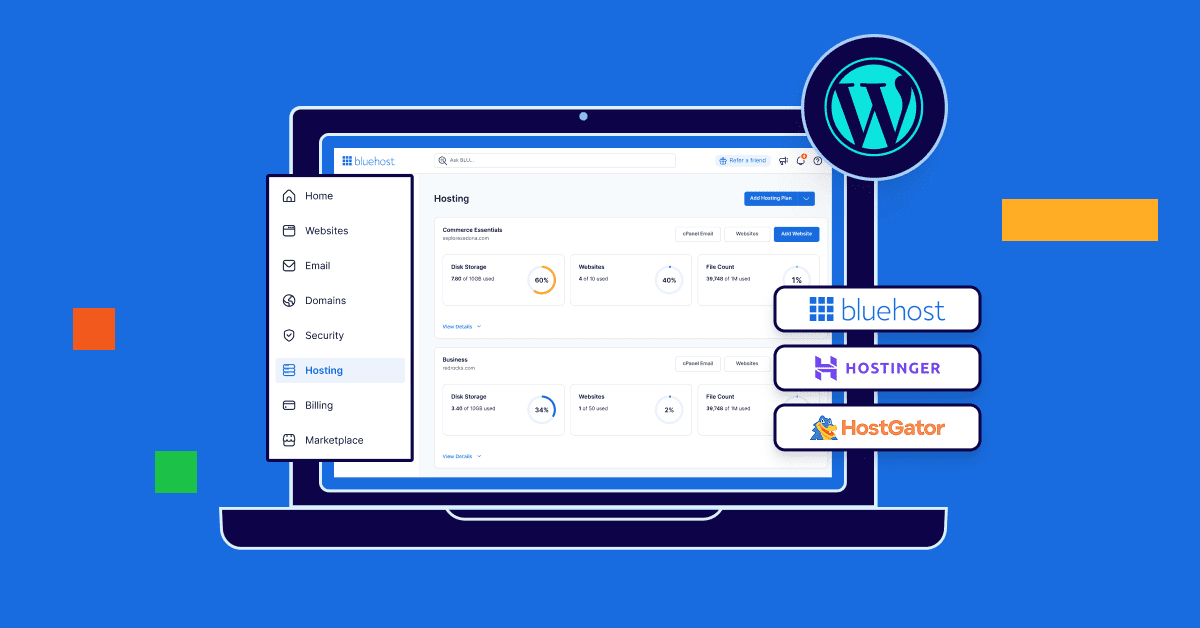Belangrijkste hoogtepunten
- Als je de juiste WordPress hosting kiest, ben je verzekerd van installatiegemak, beveiliging en betrouwbare prestaties.
- Bluehost, Liquid Web, Kinsta, A2 Hosting, InMotion Hosting, Namecheap en DreamHost vallen op door hun gebruiksvriendelijke functies.
- Kijk naar essentiële functies zoals WordPress installatie met één klik, 24/7 ondersteuning, gratis domein & SSL, betaalbare prijzen en schaalbaarheid.
- Bluehost wordt officieel aanbevolen door WordPress en biedt een intuïtief dashboard, een gratis domeinnaam en 24/7 ondersteuning.
- De beste WordPress hosting hangt af van je behoeften en Bluehost is een van de voorkeurskeuzes voor beginners in 2025.
Inleiding
Denk je erover om je eerste WordPress website te lanceren, maar voel je je overweldigd door alle hostingopties? Je bent niet de enige. Met zoveel aanbieders die snelheid, veiligheid en gebruiksgemak beloven, hoe weet je welke echt beginnersvriendelijk is?
Een betrouwbare hostingprovider zorgt ervoor dat je site eenvoudig is op te zetten, een soepele gebruikerservaring biedt en een betrouwbare uptime heeft. Niemand wil een website die tergend langzaam laadt, vaak crasht of, erger nog, gehackt wordt vanwege slechte beveiliging. De beste WordPress hosting voor beginners zorgt ervoor dat je site vanaf de eerste dag soepel en veilig draait.
Als beginner moet je je richten op het maken van inhoud en het laten groeien van je bedrijf, niet op hostingproblemen. De juiste WordPress hostingservice vereenvoudigt websitebeheer, biedt betrouwbare ondersteuning en houdt je site veilig, zodat jij je kunt richten op wat echt belangrijk is.
In deze blog geven we een overzicht van de beste beginnersvriendelijke hostingopties, zodat jij je kunt richten op het bouwen van je site zonder technische hoofdpijn. Laten we erin duiken!
Waarom het kiezen van de juiste WordPress hosting voor beginners belangrijk is
WordPress is dominant en een van de beste CMS-platforms, met 43,6% websites op internet. Deze websites maken gebruik van een betrouwbare webhostingprovider die een positieve invloed heeft op de snelheid, de gebruikerservaring en het algehele succes van hun site. Het kiezen van de beste webhosting voor WordPress beginners kan het lanceren en beheren van een website eenvoudig en stressvrij maken. Dit is hoe:
Vereenvoudigd gebruik
Als beginner heb je een hostingprovider nodig die de technische kant van je bedrijf afhandelt, inclusief WordPress-installatie, automatische updates en back-ups. Een beginnersvriendelijke host heeft een intuïtief en aangepast dashboard, zodat je je site gemakkelijk kunt beheren zonder dat je coderingsvaardigheden nodig hebt.
Snelle website
Een trage website kan bezoekers wegjagen. Prominente zoekmachines zoals Google houden ook rekening met de paginasnelheid om een site te rangschikken, wat betekent dat een trage snelheid je zichtbaarheid kan schaden. De juiste hostingprovider zorgt voor snelle laadtijden, zodat zowel bezoekers als zoekmachines tevreden zijn.
Lees ook: Optimaliseer uw site: Website Snelheidstest GTmetrix Tips
Back-up en beveiliging
Cyberbeveiliging is een echte zorg, zelfs voor beginners. Een goede WordPress host biedt ingebouwde beveiligingsfuncties zoals SSL-certificaten, malwarescanning en automatische back-ups, zodat je je geen zorgen hoeft te maken over hackers of gegevensverlies.
Schaalbaarheid
U begint misschien klein, maar wat gebeurt er als uw website groeit? Bij een ideale hostingprovider kun je gemakkelijk upgraden, zodat je site meer verkeer aankan zonder downtime of grote kosten.
Lees ook: Een schaalbaar WordPress-hostingpakket voor sites met veel verkeer
Hoe kies je de beste WordPress hosting voor beginners?
Met zoveel beschikbare opties hangt het kiezen van de beste WordPress hosting voor beginners af van je zakelijke eisen. Of je nu een blog, een online winkel of een professionele website begint, de geschikte hostingprovider is beginnersvriendelijk, betrouwbaar en betaalbaar. Hier zijn de belangrijkste factoren om te overwegen:
Gemakkelijk op te zetten
Als beginner wil je een hostingprovider die het installatieproces vereenvoudigt. Zoek naar:
- WordPress installeren met één klik
- Gebruiksvriendelijk dashboard
- Vooraf geconfigureerde instellingen
- Compatibiliteit website bouwer
Klantenondersteuning
Zelfs met een eenvoudige installatie kunt u tegen vragen of problemen aanlopen. Kies een hostingpartner die voorziet in:
- 24/7 ondersteuning
- WordPress expertise
- Inzichtelijke bronnen
Prijzen
De beste webhosting voor WordPress beginners biedt een balans tussen betaalbaarheid en benodigdheden. Overweeg:
- Introductie- vs. verlengingsprijzen
- Ingebouwde functies
- Restitutiebeleid
Prestaties
Een trage website kan bezoekers frustreren en je SEO-klasseringen schaden. Een goede hostingprovider moet dit garanderen:
- Snelle laadtijd
- Uptime-garantie
- Geoptimaliseerd voor WordPress
7 beste webhosting voor WordPress beginners
Als beginner de juiste WordPress hosting kiezen kan de prestaties van je website verbeteren en het succes ervan positief beïnvloeden.
Hier is een vergelijkingstabel om je te helpen de belangrijkste verschillen tussen de beste WordPress hostingplatforms te begrijpen:
| Hostingprovider | Beste voor | Startprijs | Vrij domein | Gratis SSL | Klantenservice |
| Bluehost | Bloggers & kleine bedrijven | $2,95/mo | ✅ | ✅ | 24/7 chat & telefoon |
| Vloeibaar web | Beheerde hosting & sites met veel verkeer | $17/mo | ❌ | ✅ | 24/7 deskundige ondersteuning |
| Kinsta | Hoge prestaties en snelheid | $35/mo | ❌ | ✅ | Eersteklas deskundige ondersteuning |
| A2 Hosting | Snelheid met een budget | $2,99/mo | ❌ | ✅ | 24/7 chat & e-mail |
| InMotion Hosting | Betrouwbare hosting & ondersteuning | $3,99/mo | ✅ | ✅ | 24/7 ondersteuning in de VS |
| Namecheap | Budgetvriendelijke hosting | $1,98/mo | ✅ | ✅ | 24/7 chat & e-mail |
| DreamHost | Eenvoud & onbeperkte functies | $2,59/mo | ✅ | ✅ | 24/7 chat & tickets |
Nu je een snelle vergelijking hebt gemaakt van de beste WordPress hostingopties, laten we elke provider in detail bekijken om je te helpen een weloverwogen beslissing te nemen.
1. Bluehost

Bluehost is een door WordPress aanbevolen, langstlopende, beginnersvriendelijke hostingprovider. Wij bieden:
- Eenvoudige WordPress-installatie met één klik: Start je website in enkele minuten
- Gebruiksvriendelijk dashboard: Beheer je website met een intuïtief bedieningspaneel
- 24/7 klantenservice: Betrouwbare hulp wanneer je die nodig hebt
- Gratis domein en SSL-certificaat: Beveilig je website zonder extra kosten
- 100% netwerk uptime: Geniet van ononderbroken prestaties
- Multi-regionale fouttolerantie: Garandeert betrouwbaarheid, zelfs in het geval van serverstoringen
Bluehost heeft een gebruiksvriendelijk dashboard en ingebouwde WordPress optimalisatie, waardoor het ideaal is voor:
- Nieuwe website-eigenaren die op zoek zijn naar een betrouwbare en aanpasbare oplossing.
- Bloggers die een eenvoudige WordPress-installatie, gratis SSL en betrouwbare prestaties nodig hebben.
- Kleine en grote bedrijven die op zoek zijn naar schaalbare, veilige en krachtige hosting met 24/7 deskundige ondersteuning.
We bieden meerdere hostingpakketten die passen bij jouw wensen:
- Basisplan wordt aanbevolen voor eenvoudige zakelijke websites en blogs
- Het plan Choice Plus wordt aanbevolen voor meerdere websites die opslag, back-ups en beveiliging nodig hebben
- Het Online Store-plan wordt aanbevolen voor e-commercewinkels met gespecialiseerde functies voor online verkoop
2. Vloeibaar web

Liquid Web is gespecialiseerd in volledig beheerde WordPress hosting, waarbij alle technische aspecten zoals updates, beveiliging, prestatieoptimalisatie en andere geavanceerde functies worden afgehandeld. Het biedt:
- Eersteklas ondersteuning: Je krijgt Heroic Support dat 24/7 deskundige hulp biedt via telefoon, chat en e-mail.
- Automatische updates en dagelijkse back-ups: De hostingprovider biedt geautomatiseerde WordPress core, thema en plugin updates om je website soepel te laten draaien. Je krijgt ook dagelijkse off-site back-ups, zodat je gegevens veilig zijn voor phishing, hacking en malware.
- Hoge prestaties zonder downtime: Profiteer van snelle laadtijden dankzij ingebouwde caching, CDN-integratie en schaalbare cloudinfrastructuur. Met 100% uptime-garanties blijft uw website online, zelfs tijdens pieken in het verkeer.
Liquid Web biedt een veilige hostingomgeving en beheert de server effectief, waardoor het ideaal is voor:
- Bedrijven en instanties die behoefte hebben aan krachtige hosting met dedicated resources.
- Groeiende websites en e-commercewinkels die zich geen downtime of trage snelheden kunnen veroorloven.
3. Kinsta

Kinsta is gebouwd op Google Cloud Platform, wat betekent dat het snelle laadtijden, automatisch schalen en een hoge uptime levert. Het omvat:
- Ingebouwde caching: De hostingprovider gebruikt caching op serverniveau en CDN-integratie om de snelheid en prestaties van de website te optimaliseren zonder dat er extra plugins nodig zijn.
- Beveiligingsfuncties: Geniet van dagelijkse malwarescanning, DDoS-bescherming en automatische firewalls, zodat je website beveiligd blijft tegen online bedreigingen.
- Automatische back-ups: Maak dagelijks automatische back-ups met herstelopties met één klik, zodat je gegevens altijd veilig en gemakkelijk te herstellen zijn.
Het heeft een intuïtief en beginnersvriendelijk dashboard, waardoor het platform ideaal is voor:
- Bloggers met veel inhoud kunnen veel verkeer aan zonder vertragingen dankzij ingebouwde snelheidsoptimalisaties.
- eCommerce winkels om transacties naadloos te laten verlopen met schaalbare bronnen en WooCommerce-specifieke optimalisaties.
- Zakelijke websites die enterprise-grade beveiliging en uptime-garanties willen voor bedrijfskritische sites.
4. A2 Hosting

A2 Hosting gebruikt Turbo Servers die pagina’s 20x sneller laden dan traditionele hosting. Het is een geschikte keuze voor beginners die op zoek zijn naar snelheid zonder een meerprijs te betalen. Het platform biedt:
- Gratis websitemigratie: Je krijgt een probleemloze websitemigratie met hulp van experts, waardoor je verzekerd bent van een soepele overgang met minimale downtime.
- SSD-opslag: De hostingprovider biedt snelle NVMe SSD-opslag, die de snelheid van de website, het reactievermogen en de databaseprestaties aanzienlijk verbetert.
- 24/7 ondersteuning: Het deskundige supportteam is 24 uur per dag bereikbaar via live chat, telefoon of e-mail.
- 30 dagen geld-terug-garantie: Je krijgt risicovrije hosting met een volledige geld-terug-garantie als je niet helemaal tevreden bent.
A2 Hosting is een betaalbare oplossing met prestatiegerichte functies, waardoor het ideaal is voor:
- Beginners die een gebruiksvriendelijk controlepaneel, gratis websitemigratie en snelheidsgeoptimaliseerde hosting willen zonder technische complexiteiten.
- Eigenaren van kleine websites voor snel ladende pagina’s, betrouwbare uptime en veilige hosting tegen budgetvriendelijke tarieven.
5. InMotion Hosting

InMotion Hosting is een vooraanstaand webhostingplatform dat uitgebreide serveroplossingen en ongeëvenaarde betrouwbaarheid biedt. Het biedt:
- Gratis websitemigratie: De hostingprovider zet je website gratis over, zonder downtime.
- Solide beveiligingsfuncties: Je krijgt een gratis SSL-certificaat, DDoS-bescherming en automatische back-ups.
- 24/7 ondersteuning in de VS: Het ondersteuningsteam is altijd beschikbaar om te helpen met het oplossen van technische problemen, het optimaliseren van de prestaties of het instellen van WordPress.
Een van de beste WordPress hosting voor beginners, InMotion Hosting levert snelheid, schaalbaarheid en 99,9% uptime, waardoor het geschikt is voor:
- Nieuwe website-eigenaren die een eenvoudige installatie, gratis migratie en betrouwbare ondersteuning willen.
- Freelancers die flexibiliteit nodig hebben om projecten van meerdere klanten efficiënt te beheren.
- E-commercewinkels die op zoek zijn naar soepele online transacties en hoge conversies.
- Bureaus en ontwikkelaars die toegang nodig hebben tot gebruiksvriendelijke tools en geavanceerde prestatieoptimalisaties voor naadloos projectbeheer en implementatie.
6. Namecheap

Namecheap is een betaalbaar hostingplatform met solide WordPress hostingfuncties. De EasyWP managed WordPress hostingoplossing van het webhostingplatform biedt:
- Gratis domein en SSL-certificaat: Je krijgt een gratis domeinnaam voor het eerste jaar, samen met een gratis SSL-certificaat om je websitegegevens te versleutelen.
- Snelle prestaties: De hostingprovider wordt aangedreven door snelle SSD-opslag, ingebouwde caching en geoptimaliseerde serverinfrastructuur.
- WordPress optimalisatie: Ontworpen voor moeiteloze WordPress-prestaties en biedt installatie met één klik, automatische updates en een intuïtief dashboard.
NameCheap is een ideale keuze voor gebruikers die ruimte, kracht, eenvoud en snelheid nodig hebben. Het platform biedt een voordelige hostingoplossing zonder basisfunctionaliteit op te offeren, waardoor het ideaal is voor:
- Persoonlijke bloggers die een kosteneffectieve, eenvoudig te beheren hostingoplossing nodig hebben.
- Kleine websites die op zoek zijn naar betrouwbare hosting met essentiële functies zoals gratis SSL, snelle installatie en schaalbaarheid.
Lees ook: Bluehost vs. Namecheap Een uitgebreide vergelijking
7. DreamHost

DreamHost staat bekend om zijn eenvoudige setup, onbeperkte bandbreedte en geen langetermijnverplichtingen. Het biedt:
- Eenvoudige installatie: Zet je website snel op met een WordPress-installatie met één klik en een intuïtief configuratiescherm voor beginners.
- Onbeperkte bandbreedte: Geniet van onbeperkt verkeer zonder limieten, zodat uw website soepel blijft presteren terwijl hij groeit.
- Gratis WordPress migraties: Zet je bestaande site naadloos over met de geautomatiseerde migratietool van DreamHost of de migratiedienst met hulp van een expert, zonder extra kosten.
- Eenvoudige prijsstructuur: Transparante en betaalbare plannen zonder verborgen kosten, zodat u gemakkelijk het juiste hostingpakket kunt kiezen zonder verrassingen.
DreamHost zorgt ervoor dat je website snel, veilig en altijd actief is. Het biedt eenvoudige shared hosting met onbeperkte opslagruimte en functies, waardoor het ideaal is voor:
- Bloggers die betaalbare, betrouwbare hosting nodig hebben met eenvoudige WordPress-integratie en snelle prestaties.
- Non-profits die op zoek zijn naar budgetvriendelijke hosting met sterke beveiliging, onbeperkte bandbreedte en gratis domeinopties.
- Kleine bedrijven die schaalbare hosting, gratis migraties en een eenvoudige setup nodig hebben om hun online aanwezigheid moeiteloos te vestigen.
Bluehost: De beste keuze voor WordPress beginners
Beginners zijn op zoek naar de eenvoudigste webhosting platformen en dat is waar Bluehost zich onderscheidt. Wij combineren gebruiksgemak en een uitgebreid pakket aan tools om je WordPress website moeiteloos te lanceren. Onze reeks functies omvatten:
1. WordPress installeren met één klik
Het opzetten van WordPress kan intimiderend zijn voor beginners, maar met de één-klik installatie van Bluehost heb je geen technische vaardigheden nodig. In slechts een paar minuten is je WordPress site geïnstalleerd en klaar om aan te passen, zonder handmatige installatie of codering.
2. 24/7 ondersteuning voor niet-technische gebruikers
Als je tegen problemen aanloopt, biedt Bluehost 24 uur per dag klantenservice via live chat en telefoon. Onze WordPress-experts, die deel uitmaken van ons supportteam, helpen je met alles van het opzetten van je site tot het oplossen van technische problemen, zodat je nooit zonder hulp komt te zitten.
3. Gratis domein en SSL voor nieuwe gebruikers
Als je je aanmeldt, krijg je het eerste jaar een gratis domeinnaam, zodat je er niet apart een hoeft aan te schaffen. Bovendien is een gratis SSL-certificaat inbegrepen om je site te beveiligen en vertrouwen op te bouwen bij bezoekers, wat essentieel is voor het beschermen van gevoelige informatie en het verbeteren van de zoekresultaten.
4. Betaalbare prijzen voor beginners
Bluehost biedt budgetvriendelijke plannen die alle essentiële functies bevatten zonder verborgen kosten. Of u nu een blog of een zakelijke website begint, onze betaalbare prijzen zorgen ervoor dat u eersteklas hosting krijgt zonder dat het u geld kost.
Lees ook: Top 10 Webhosting van maand tot maand voor flexibel budgetteren
We bieden ook WonderSuite website builder om het proces van het opzetten van een site te vereenvoudigen. Met onze AI-tools kun je in een paar stappen je website aanpassen en online gaan.
Laatste gedachten
Het kiezen van de beste WordPress hosting voor beginners hangt af van je specifieke bedrijfsbehoeften. Elk hostingplatform heeft verschillende functies en voordelen die zijn afgestemd op verschillende website-eigenaren.
Bluehost, een WordPress aanbevolen platform sinds 2005, onderscheidt zich met krachtige tools, beginnersvriendelijke functies en betrouwbare prestaties.
Ben je op zoek naar een betrouwbaar WordPress hosting platform met 100% uptime garantie? Begin vandaag nog met Bluehost.
FAQs
De beste WordPress hosting voor beginners moet gebruiksvriendelijk, betrouwbaar en betaalbaar zijn. Bluehost is een top keuze omdat het één-klik WordPress installatie, WordPress thema’s, 24/7 ondersteuning, een gratis domein en SSL beveiliging biedt, waardoor het geschikt is voor beginnende website eigenaren.
Ja, Bluehost is een van de beste webhosting voor WordPress beginners vanwege het eenvoudige installatieproces, het gebruiksvriendelijke dashboard en de speciale WordPress ondersteuning. Met een uitgebreid pakket aan tools en functies maakt Bluehost het iedereen gemakkelijk om een WordPress website te bouwen en te beheren.
Een beginnersvriendelijke WordPress hostingprovider moet het volgende bieden:
WordPress installatie met één klik
24/7 klantenondersteuning
Gebruiksvriendelijk dashboard
Automatische updates en back-ups
Betaalbare prijzen



Schrijf een reactie